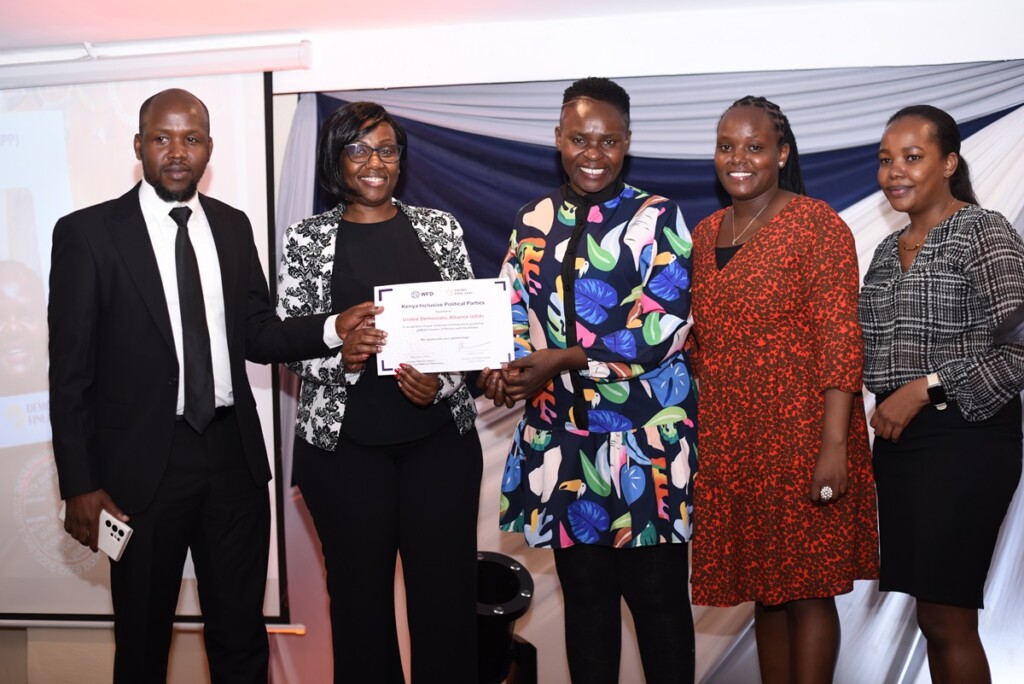
Demo Finland in Kenya
The co-operation started in 2020.
Partner: Westminster Foundation for Democracy (WFD)
The programme aims to support the capacity of Kenyan political parties in the inclusion of persons with disabilities and to strengthen the civil and political rights of persons with disabilities. The programme has trained representatives and members of 20 Kenyan political parties on the inclusion and participation of persons with disabilities in democracy and the challenges faced by people with disabilities in politics. The programme will also support the parties in making policies more inclusive and mainstreaming disability themes. In addition, the programme supports co-operation between various political actors such as election authorities, political parties, equity officials and organisations of persons with disabilities.
Results of our work
- 19 parties have established disability leagues, 17 parties have appointed persons with disabilities as candidates for their National Executive Councils and 21 parties have amended their documents and structures to be more inclusive.
- Political parties, in co-operation with civil society organisations, developed 10 minimum standards of inclusion for political parties. These standards are applied by the Office of the Registrar of Political Parties (ORPP). In 2024, the ORPP committed to disseminating the standards to all political parties in Kenya and supporting their application and implementation.
- The programme established the National Disability Multi-Party Caucus, composed of 20 political parties, to promote the political participation of persons with disabilities throughout the Kenyan political system. In collaboration with the Kenya Disability Parliamentary Association (KEDIPA) and organisations of persons with disabilities, the caucus reviewed the Kenyan Political Parties Act and produced significant proposals for its amendment in 2024.
- The programme developed a set of concrete tools that CSOs and organisations of persons with disabilities can use to assess the extent to which and how the political parties and the government are fulfilling their promises in disability inclusion. 14 organisations are actively using this tool.
Background on Kenya
Kenya has had a multi-party system since 1992. Elections are held regularly, and the political party system is fairly well regulated by law. The legislative and executive branches are separated, and the judiciary is formally separate. However, the president has extensive autonomous power. In Kenya, political parties have traditionally formed around a single strong leader, representing the leader’s region and county. As a result, the parties have been ethnic in their core, and therefore lack a social philosophy and programmes based on it, as well as knowledge or experience of intra-party democracy.
In 2024, Kenyan youth led widespread protests, demanding accountability, transparency and inclusiveness from the Kenyan political system. Police violently suppressed demonstrations, killing approximately 100 people. The protests were the first in the country’s history in which citizens demanded democratic action from all politicians. As a result, President William Ruto cancelled planned tax increases and changed much of his government to a more politically representative one.
- Ranked 74/179 in V-Dem’s Liberal Democracy Index.
- Classified as an electoral democracy* by V-Dem.
- Latest parliamentary election: 2022.
- Women in parliament: the National Assembly 23%, the Senate 31%.
- The UN Covenant on Civil and Political Rights was ratified in 1972.
- The UN Convention on the Rights of Women was ratified in 1984.
- The UN Convention on the Rights of Persons with Disabilities was ratified in 2008.
- More information on the state of democracy in Kenya: https://www.idea.int/democracytracker/country/kenya
*In electoral democracies, there are free and fair multi-party elections and satisfactory degrees of human rights and political rights, but not all the criteria of a liberal democracy are met.
